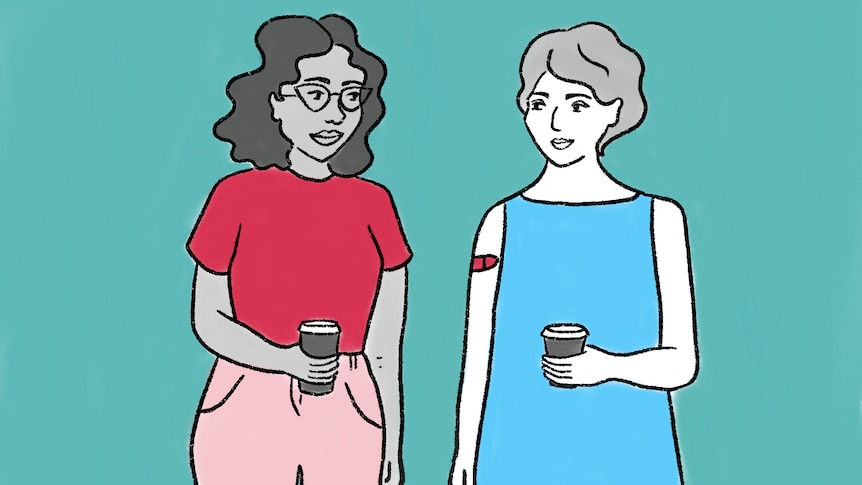Victorian hospitals insist AstraZeneca vaccine is safe, amid reports of 'quibbling' among healthcare workers
By
Kristian Silva and
Jessica Longbottom
Posted 3hhours ago, updated 1hhour ago
Most Australian adults will be offered the AstraZeneca vaccine.(
ABC News: Isabella Higgins
)
Share
Some Victorian healthcare workers have been told they will be sent to "the back of the queue" if they miss vaccine appointments, as some hold out hope of receiving the Pfizer jab instead of the AstraZeneca injection.
Key points:
- Pointed emails have been sent to health staff, telling them not to be picky over which vaccine they receive
- Authorities insist both the Pfizer and AstraZeneca vaccines are safe
- Some staff have expressed concerns over possible side effects from the AstraZeneca vaccine
It comes amid reports of reluctance among some workers to get the AstraZeneca injection, which is now being produced in Melbourne by CSL and is more widely available than the Pfizer product.
An email, sent to all staff at Austin Health last week, reiterates to workers that "you do not get your choice of vaccine".
"Both vaccines have been shown to be very safe and effective, with the recent release of the outcomes of AstraZeneca clinical trials in the United States providing further specific evidence of the efficacy and safety of that vaccine," chief executive Adam Horsburgh wrote.
Mr Horsburgh noted concerns among staff may have been fuelled by reports of possible side effects from the AstraZeneca injection in Europe. However, he said there was no sign the vaccine was linked to blood clots.
Mr Horsburgh urged staff to treat colleagues with respect, saying there had been people "taking their frustrations out" on vaccination clinic and call centre staff.
Frontline health workers are among the first to receive vaccines before the rest of the population. (
ABC News: Harry Frost
)
Another all-staff email from Northern Health, signed by the service's infectious diseases director and chief medical officer, said "both available brands are safe and have excellent efficacy".
So you have questions about the COVID vaccines? We have answers

Confused about Australia's vaccine rollout? We've tracked down the answers to the questions you've been asking.
Read more
Craig Aboltins and Wanda Stelmach said staff were "privileged" to have access to the vaccines, given there had been 2.5 million COVID-19 deaths worldwide.
"The brand of vaccine is not allocated according to priority group and individuals can't choose which brand they receive," they wrote.
Victoria's Department of Health has confirmed it is not mandatory for frontline workers or those dealing directly with COVID-19 patients to be vaccinated.
Across the country, more than 670,000 people have received COVID-19 vaccines, well behind the federal government's initial target of 4 million by the end of March.
The rollout has been especially slow at doctors' clinics, where most phase 1B recipients have been instructed to attend.
Reports of workers 'quibbling' over vaccine choice
Annie Butler, the federal secretary of the Australian Nursing and Midwifery Federation, said she had heard reports of workers "quibbling" over which vaccine they received.
"I haven't heard this to be a huge issue uniformly across the country, but I have heard small pockets of it."
Space to play or pause, M to mute, left and right arrows to seek, up and down arrows for volume.
LISTEN
Duration: 13 minutes 22 seconds13m
Listen to Annie Butler's interview with Virginia Trioli
Download 6.1 MB
At Barwon Health, where both drugs were being administered, chief executive Frances Diver said "small numbers" of staff had tried to re-book appointments in order to receive a different vaccine.
"Some people have raised concerns about the difference between Pfizer and AstraZeneca," Ms Diver said, while adding both drugs were safe.
Ms Diver said staff who turned up to appointments were not given a choice of which drug was administered, and any unfilled spots were quickly filled by other workers.
Like other vaccines, there are well-known side effects
Space to play or pause, M to mute, left and right arrows to seek, up and down arrows for volume.
WATCH
Duration: 1 minute1m
AstraZeneca vaccine rollout should not be suspended, say experts.
Suzi Nou, the president of the Australian Society of Anaesthetists, said some workers were reluctant to receive the AstraZeneca injection because of concerns around short-term side effects.
"Among colleagues in private, they're definitely scheduling their vaccines at the end of the working week, because if they're getting those side effects they want it to happen on the weekend, not when they're at work," she said.
"But that's not unique to any vaccine.
How to talk about vaccines

It's normal for people to have questions about new vaccines. So what's the best way to respond?
Read more
"I work in operating theatres, I'm exposed to it … almost every lift I'm in, whenever I'm in theatre, I get asked what I think about the vaccine."
Ms Nou said there had been hesitancy among female workers who wanted to get pregnant.
The current Federal Health advice said the Pfizer and AstraZeneca drugs did not impact fertility and there was no evidence suggesting an increased risk of pregnancy complications afterwards.
Pregnant women are normally not recommended to receive the vaccines, but should consider it if they were at high risk of being exposed to COVID-19.
Federal Health Department information sheets tell recipients of the AstraZeneca vaccine that less-common side effects, such as dizziness and stomach pain, are usually mild and subside in one or two days.
As with other vaccines, such as the flu jab, common side effects include pain and tenderness in the injection area, fatigue, headaches and fever.
Similar common side effects have also been listed for the Pfizer vaccine, with one doctor describing his
post-injection experience as "vigorous".
Space to play or pause, M to mute, left and right arrows to seek, up and down arrows for volume.
WATCH
Duration: 4 minutes 2 seconds4m 2s
How will the coronavirus vaccines work?
Findings recently published in The Lancet found the AstraZeneca vaccine had
an 81 per cent efficacy rate when its second dose was given three months after the first.
Australia's Therapeutic Goods Administration and the European Medicines Agency (EMA)
continue to back the rollout of the AstraZeneca vaccine.
In recent weeks,
several European countries and Canada suspended or restricted their usage of the vaccine due to a small number of recipients developing blood clots.
However, the EMA has stated that the vaccine was not associated with an increase in blood clot risks, and the benefits of the AstraZeneca injection outweighed the risk of side effects.
 Indonesian soldiers sit as one of them receives a dose of China’s Sinovac Biotech vaccine for the coronavirus disease (Covid-19), during a mass vaccination program at a sport hall in Jakarta, Indonesia, March 10, 2021. — Reuters pic
Indonesian soldiers sit as one of them receives a dose of China’s Sinovac Biotech vaccine for the coronavirus disease (Covid-19), during a mass vaccination program at a sport hall in Jakarta, Indonesia, March 10, 2021. — Reuters pic




